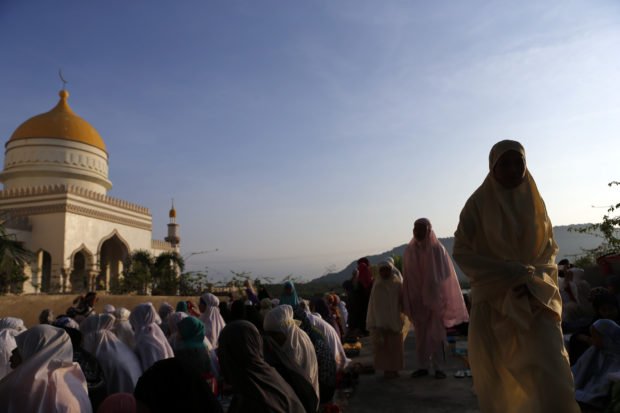Empty mosques during Ramadan

DIFFERENTRAMADAN In this file photo, Muslims pray at the GrandMosque in Cotabato City, nowthe government center of Bangsamoro Autonomous Region in Muslim Mindanao. This year’s Ramadan will be observed differently as Muslims in the region are asked to pray in their homes because mosques will be closed to prevent the spread of the coronavirus. —JEOFFREY MAITEM
KORONADAL CITY, South Cotabato, Philippines — Muslim Filipinos will observe Ramadan (holy month of fasting, prayer and reflection) differently this year, no thanks to the new coronavirus disease (COVID-19) pandemic.
In the past few weeks, residents of the Bangsamoro Autonomous Region in Muslim Mindanao (BARMM) have been restricted from going to mosques for Friday congregational prayers as a precautionary measure to prevent the spread of the virus that has infected more than 2.4 million people and killed 165,238 around the world.
Under Islam, Muslim men are supposed to pray in congregation five times daily at mosques, a rule that the BARMM’s Regional Darul Ifta’ (RDI) or Islamic Advisory Council strongly discouraged at this time of the pandemic.
Pray at home
Muslim Filipinos, for the first time, will also have to alter the practice of their faith, particularly the “taraweeh” prayers (ritual prayers), as the country grapples with the impact of the pandemic. The Philippines had recorded 6,459 confirmed COVID-19 cases and 428 deaths as of Monday afternoon.“One can perform the Sunnat Taraweeh prayers at their home,” said Abuhuraira Udasan, BARMM’s grand mufti (Islamic legal expert), in an April 16 “fatwa” (religious guideline).
The fatwa suspended the holding of taraweeh prayers in mosques during Ramadan, he said.During the nightly special taraweeh prayers, devotees stand shoulder-to-shoulder, which could run against physical distancing, one of the measures against the spread of the virus. Udasan said COVID-19 had remained a threat globally, hence the need to cancel mass gatherings as a precaution.
Gandhi Kinjiyo, vice president of the peace group Katiyakap Inc., said he would heed the guidance of the Islamic scholars to perform the taraweeh prayer at home.
“This is something new because all these years, we performed the special taraweeh prayer inside the mosque,” he told the Inquirer.
But he was thankful that the RDI issued the directive ahead of the Ramadan, a move he described as “prudent and swift” in this time of the pandemic.Moon sighting
Ramadan is the ninth month of the Muslim calendar where Muslims across the world fast from dawn to dusk, pray and give alms in observance of Islam’s holiest month.
Udasan said Islamic scholars in Mindanao were preparing for the moon sighting to determine the start of this year’s Ramadan.
The region’s ulama (religious experts) have agreed to hold the moon sighting on Wednesday, he said. If the moon is sighted on that day, the first day of Ramadan will be on Thursday; if not, Friday will be declared the start of the holy month. INQ
For more news about the novel coronavirus click here.
What you need to know about Coronavirus.
For more information on COVID-19, call the DOH Hotline: (02) 86517800 local 1149/1150.
The Inquirer Foundation supports our healthcare frontliners and is still accepting cash donations to be deposited at Banco de Oro (BDO) current account #007960018860 or donate through PayMaya using this link.